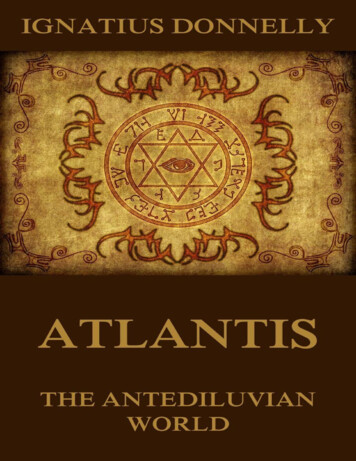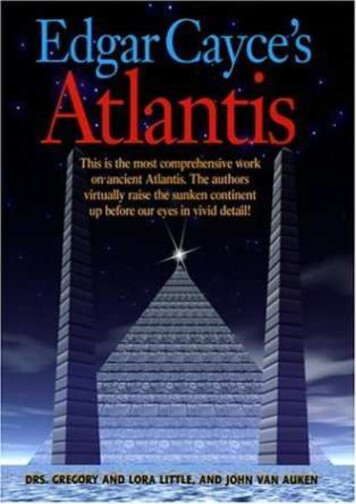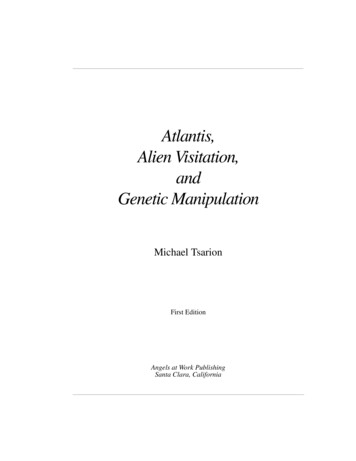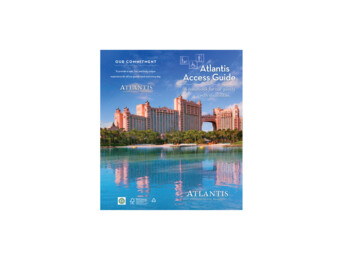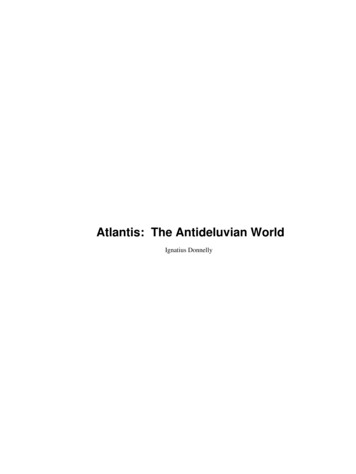
Transcription
Atlantis: The Antideluvian WorldIgnatius Donnelly
Atlantis: The Antideluvian WorldTable of ContentsAtlantis: The Antideluvian World.1Ignatius Donnelly.1PART I. THE HISTORY OF ATLANTIS.2CHAPTER I. THE PURPOSE OF THE BOOK.2CHAPTER II. PLATO'S HISTORY OF ATLANTIS.3CHAPTER III. THE PROBABILITIES OF PLATO'S STORY.11CHAPTER IV. WAS SUCH A CATASTROPHE POSSIBLE?.16CHAPTER. V. THE TESTIMONY OF THE SEA.21CHAPTER VI. THE TESTIMONY OF THE FLORA AND FAUNA.23PART II. THE DELUGE.27CHAPTER I. THE DESTRUCTION OF ATLANTIS DESCRIBED IN THE DELUGELEGENDS.27CHAPTER II. THE DELUGE OF THE BIBLE.29CHAPTER III. THE DELUGE OF THE CHALDEANS.32CHAPTER IV. THE DELUGE LEGENDS OF OTHER NATIONS.37CHAPTER V. THE DELUGE LEGENDS OF AMERICA.43CHAPTER VI. SOME CONSIDERATION OF THE DELUGE LEGENDS.54PART III. THE CIVILIZATION OF THE OLD WORLD AND NEW COMPARED.59CHAPTER I. CIVILIZATION AN INHERITANCE.59CHAPTER II. THE IDENTITY OF THE CIVILIZATIONS OF THE OLD WORLD AND THENEW MOSAICS AT MITLA, MEXICO.62CHAPTER III. AMERICAN EVIDENCES OF INTERCOURSE WITH EUROPE ORATLANTIS.74CHAPTER IV. CORROBORATING CIRCUMSTANCES.77CHAPTER V. THE QUESTION OF COMPLEXION.83CHAPTER VI. GENESIS CONTAINS A HISTORY OF ATLANTIS.87CHAPTER VII. THE ORIGIN OF OUR ALPHABET.95CHAPTER VIII. THE BRONZE AGE IN EUROPE.105CHAPTER IX. ARTIFICIAL DEFORMATION OF THE SKULL.114PART IV. THE MYTHOLOGIES OF THE OLD WORLD A RECOLLECTION OF ATLANTIS.116CHAPTER I. TRADITIONS OF ATLANTIS.117CHAPTER II. THE KINGS OF ATLANTIS BECOME THE GODS OF THE GREEKS.120CHAPTER III. THE GODS OF THE PHOENICIANS ALSO KINGS OF ATLANTIS.131CHAPTER IV. THE GOD ODIN, WODEN, OR WOTAN.133CHAPTER V. THE PYRAMID, THE CROSS, AND THE GARDEN OF EDEN.135CHAPTER VI. GOLD AND SILVER THE SACRED METALS OF ATLANTIS.146PART V. THE COLONIES OF ATLANTIS.149CHAPTER I. THE CENTRAL AMERICAN AND MEXICAN COLONIES.149CHAPTER II. THE EGYPTIAN COLONY.152CHAPTER III. THE COLONIES OF THE MISSISSIPPI VALLEY.158CHAPTER IV. THE IBERIAN COLONIES OF ATLANTIS.164CHAPTER V. THE PERUVIAN COLONY.166CHAPTER VI. THE AFRICAN COLONIES.172CHAPTER VII. THE IRISH COLONIES FROM ATLANTIS.174CHAPTER VIII. THE OLDEST SON OF NOAH.180CHAPTER IX. THE ANTIQUITY OF SOME OF OUR GREAT INVENTIONS.188CHAPTER X. THE ARYAN COLONIES FROM ATLANTIS.195CHAPTER XI. ATLANTIS RECONSTRUCTED.202i
Atlantis: The Antideluvian WorldIgnatius DonnellyThis page copyright 2001 Blackmask Online.http://www.blackmask.com PART I. THE HISTORY OF ATLANTIS. CHAPTER I. THE PURPOSE OF THE BOOK. CHAPTER II. PLATO'S HISTORY OF ATLANTIS. CHAPTER III. THE PROBABILITIES OF PLATO'S STORY. CHAPTER IV. WAS SUCH A CATASTROPHE POSSIBLE? CHAPTER. V. THE TESTIMONY OF THE SEA. CHAPTER VI. THE TESTIMONY OF THE FLORA AND FAUNA. PART II. THE DELUGE. CHAPTER I. THE DESTRUCTION OF ATLANTIS DESCRIBED IN THE DELUGE LEGENDS. CHAPTER II. THE DELUGE OF THE BIBLE CHAPTER III. THE DELUGE OF THE CHALDEANS. CHAPTER IV. THE DELUGE LEGENDS OF OTHER NATIONS. CHAPTER V. THE DELUGE LEGENDS OF AMERICA. CHAPTER VI. SOME CONSIDERATION OF THE DELUGE LEGENDS. PART III. THE CIVILIZATION OF THE OLD WORLD AND NEW COMPARED. CHAPTER I. CIVILIZATION AN INHERITANCE. CHAPTER II. THE IDENTITY OF THE CIVILIZATIONS OF THE OLD WORLD AND THENEW MOSAICS AT MITLA, MEXICO CHAPTER III. AMERICAN EVIDENCES OF INTERCOURSE WITH EUROPE OR ATLANTIS. CHAPTER IV. CORROBORATING CIRCUMSTANCES. CHAPTER V. THE QUESTION OF COMPLEXION. CHAPTER VI. GENESIS CONTAINS A HISTORY OF ATLANTIS CHAPTER VII. THE ORIGIN OF OUR ALPHABET CHAPTER VIII. THE BRONZE AGE IN EUROPE. CHAPTER IX. ARTIFICIAL DEFORMATION OF THE SKULL. PART IV. THE MYTHOLOGIES OF THE OLD WORLD A RECOLLECTION OF ATLANTIS. CHAPTER I. TRADITIONS OF ATLANTIS. CHAPTER II. THE KINGS OF ATLANTIS BECOME THE GODS OF THE GREEKS. CHAPTER III. THE GODS OF THE PHOENICIANS ALSO KINGS OF ATLANTIS. CHAPTER IV. THE GOD ODIN, WODEN, OR WOTAN. CHAPTER V. THE PYRAMID, THE CROSS, AND THE GARDEN OF EDEN. CHAPTER VI. GOLD AND SILVER THE SACRED METALS OF ATLANTIS. PART V. THE COLONIES OF ATLANTIS. CHAPTER I. THE CENTRAL AMERICAN AND MEXICAN COLONIES. CHAPTER II. THE EGYPTIAN COLONY. CHAPTER III. THE COLONIES OF THE MISSISSIPPI VALLEY CHAPTER IV. THE IBERIAN COLONIES OF ATLANTIS CHAPTER V. THE PERUVIAN COLONY. CHAPTER VI. THE AFRICAN COLONIES. CHAPTER VII. THE IRISH COLONIES FROM ATLANTIS. CHAPTER VIII. THE OLDEST SON OF NOAH.Atlantis: The Antideluvian World1
Atlantis: The Antideluvian World CHAPTER IX. THE ANTIQUITY OF SOME OF OUR GREAT INVENTIONS. CHAPTER X. THE ARYAN COLONIES FROM ATLANTIS. CHAPTER XI. ATLANTIS RECONSTRUCTED.Produced by Norman WolcottThe world has made such comet like advanceLately on science, we may almost hope,Before we die of sheer decay, to learnSomething about our infancy; when livedThat great, original, broad eyed, sunken race,Whose knowledge, like the sea sustaining rocks,Hath formed the base of this world's fluctuous lore FESTUS.PART I. THE HISTORY OF ATLANTIS.CHAPTER I. THE PURPOSE OF THE BOOK.This book is an attempt to demonstrate several distinct and novel propositions. These are:1. That there once existed in the Atlantic Ocean, opposite the mouth of the Mediterranean Sea, a large island,which was the remnant of an Atlantic continent, and known to the ancient world as Atlantis.2. That the description of this island given by Plato is not, as has been long supposed, fable, but veritablehistory.3. That Atlantis was the region where man first rose from a state of barbarism to civilization.4. That it became, in the course of ages, a populous and mighty nation, from whose overflowings the shoresof the Gulf of Mexico, the Mississippi River, the Amazon, the Pacific coast of South America, theMediterranean, the west coast of Europe and Africa, the Baltic, the Black Sea, and the Caspian werepopulated by civilized nations.5. That it was the true Antediluvian world; the Garden of Eden; the Gardens of the Hesperides; the ElysianFields; the Gardens of Alcinous; the Mesomphalos; the Olympos; the Asgard of the traditions of the ancientnations; representing a universal memory of a great land, where early mankind dwelt for ages in peace andhappiness.6. That the gods and goddesses of the ancient Greeks, the Phoenicians, the Hindoos, and the Scandinavianswere simply the kings, queens, and heroes of Atlantis; and the acts attributed to them in mythology are aconfused recollection of real historical events.7. That the mythology of Egypt and Peru represented the original religion of Atlantis, which wassun worship.8. That the oldest colony formed by the Atlanteans was probably in Egypt, whose civilization was areproduction of that of the Atlantic island.9. That the implements of the "Bronze Age" of Europe were derived from Atlantis. The Atlanteans were alsothe first manufacturers of iron.PART I. THE HISTORY OF ATLANTIS.2
Atlantis: The Antideluvian World10. That the Phoenician alphabet, parent of all the European alphabets, was derived from au Atlantisalphabet, which was also conveyed from Atlantis to the Mayas of Central America.11. That Atlantis was the original seat of the Aryan or Indo European family of nations, as well as of theSemitic peoples, and possibly also of the Turanian races.12. That Atlantis perished in a terrible convulsion of nature, in which the whole island sunk into the ocean,with nearly all its inhabitants.13. That a few persons escaped in ships and on rafts, and, carried to the nations east and west the tidings ofthe appalling catastrophe, which has survived to our own time in the Flood and Deluge legends of thedifferent nations of the old and new worlds.If these propositions can be proved, they will solve many problems which now perplex mankind; they willconfirm in many respects the statements in the opening chapters of Genesis; they will widen the area ofhuman history; they will explain the remarkable resemblances which exist between the ancient civilizationsfound upon the opposite shores of the Atlantic Ocean, in the old and new worlds; and they will aid us torehabilitate the fathers of our civilization, our blood, and our fundamental ideas the men who lived, loved,and labored ages before the Aryans descended upon India, or the Phoenician had settled in Syria, or the Gothhad reached the shores of the Baltic.The fact that the story of Atlantis was for thousands of years regarded as a fable proves nothing. There is anunbelief which grows out of ignorance, as well as a scepticism which is born of intelligence. The peoplenearest to the past are not always those who are best informed concerning the past.For a thousand years it was believed that the legends of the buried cities of Pompeii and Herculaneum weremyths: they were spoken of as "the fabulous cities." For a thousand years the educated world did not creditthe accounts given by Herodotus of the wonders of the ancient civilizations of the Nile and of Chaldea. Hewas called "the father of liars." Even Plutarch sneered at him. Now, in the language of Frederick Schlegel,"the deeper and more comprehensive the researches of the moderns have been, the more their regard andesteem for Herodotus has increased." Buckle says, "His minute information about Egypt and Asia Minor isadmitted by all geographers."There was a time when the expedition sent out by Pharaoh Necho to circumnavigate Africa was doubted,because the explorers stated that after they had progressed a certain distance the sun was north of them; thiscircumstance, which then aroused suspicion, now proves to us that the Egyptian navigators had really passedthe equator, and anticipated by 2100 years Vasquez de Gama in his discovery of the Cape of Good Hope.If I succeed in demonstrating the truth of the somewhat startling propositions with which I commenced thischapter, it will only be by bringing to bear upon the question of Atlantis a thousand converging lines of lightfrom a multitude of researches made by scholars in different fields of modern thought. Further investigationsand discoveries will, I trust, confirm the correctness of the conclusions at which I have arrived.CHAPTER II. PLATO'S HISTORY OF ATLANTIS.Plato has preserved for us the history of Atlantis. If our views are correct, it is one of the most valuablerecords which have come down to us from antiquity.Plato lived 400 years before the birth of Christ. His ancestor, Solon, was the great law giver of Athens 600years before the Christian era. Solon visited Egypt. Plutarch says, "Solon attempted in verse a largeCHAPTER II. PLATO'S HISTORY OF ATLANTIS.3
Atlantis: The Antideluvian Worlddescription, or rather fabulous account of the Atlantic Island, which he had learned from the wise men ofSais, and which particularly concerned the Athenians; but by reason of his age, not want of leisure (as Platowould have it), he was apprehensive the work would be too much for him, and therefore did not go throughwith it. These verses are a proof that business was not the hinderance:"'I grow in learning as I grow in age.'And again:"'Wine, wit, and beauty still their charms bestow, Light all the shades of life, and cheer us as we go.'"Plato, ambitious to cultivate and adorn the subject of the Atlantic Island, as a delightful spot in some fairfield unoccupied, to which also be had some claim by reason of his being related to Solon, laid outmagnificent courts and enclosures, and erected a grand entrance to it, such as no other story, fable, or Poemever had. But, as he began it late, he ended his life before the work, so that the more the reader is delightedwith the part that is written, the more regret he has to find it unfinished."There can be no question that Solon visited Egypt. The causes of his departure from Athens, for a period often years, are fully explained by Plutarch. He dwelt, be tells us,"On the Canopian shore, by Nile's deep mouth."There be conversed upon points of philosophy and history with the most learned of the Egyptian priests. Hewas a man of extraordinary force and penetration of mind, as his laws and his sayings, which have beenpreserved to us, testify. There is no improbability in the statement that be commenced in verse a history anddescription of Atlantis, which be left unfinished at his death; and it requires no great stretch of theimagination to believe that this manuscript reached the bands of his successor and descendant, Plato; ascholar, thinker, and historian like himself, and, like himself, one of the profoundest minds of the ancientworld. the Egyptian priest had said to Solon, "You have no antiquity of history, and no history of antiquity;"and Solon doubtless realized fully the vast importance of a record which carried human history back, not onlythousands of years before the era of Greek civilization, but many thousands of years before even theestablishment of the kingdom of Egypt; and be was anxious to preserve for his half civilized countrymen thisinestimable record of the past.We know of no better way to commence a book about Atlantis than by giving in full the record preserved byPlato. It is as follows:'Critias'. Then listen, Socrates, to a strange tale, which is, however, certainly true, as Solon, who was thewisest of the seven sages, declared. He was a relative and great friend of my great grandfather, Dropidas, asbe himself says in several of his poems; and Dropidas told Critias, my grandfather, who remembered, andtold us, that there were of old great and marvellous actions of the Athenians, which have passed into oblivionthrough time and the destruction of the human race and one in particular, which was the greatest of them all,the recital of which will be a suitable testimony of our gratitude to you.'Socrates'. Very good; and what is. this ancient famous action of which Critias spoke, not as a mere legend,but as a veritable action of the Athenian State, which Solon recounted!'Critias'. I will tell an old world story which I heard from an aged man; for Critias was, as be said, at thattime nearly ninety years of age, and I was about ten years of age. Now the day was that day of the Apaturiawhich is called the registration of youth; at which, according to custom, our parents gave prizes forrecitations, and the poems of several poets were recited by us boys, and many of us sung the poems of Solon,CHAPTER II. PLATO'S HISTORY OF ATLANTIS.4
Atlantis: The Antideluvian Worldwhich were new at the time. One of our tribe, either because this was his real opinion, or because he thoughtthat he would please Critias, said that, in his judgment, Solon was not only the wisest of men but the noblestof poets. The old man, I well remember, brightened up at this, and said, smiling: "Yes, Amynander, if Solonhad only, like other poets, made poetry the business of his life, and had completed the tale which he broughtwith him from Egypt, and had not been compelled, by reason of the factions and troubles which he foundstirring in this country when he came home, to attend to other matters, in my opinion be would have been asfamous as Homer, or Hesiod, or any poet.""And what was that poem about, Critias?" said the person who addressed him."About the greatest action which the Athenians ever did, and which ought to have been most famous, butwhich, through the lapse of time and the destruction of the actors, has not come down to us.""Tell us," said the other, "the whole story, and bow and from whom Solon heard this veritable tradition."He replied: "At the head of the Egyptian Delta, where the river Nile divides, there is a certain district which iscalled the district of Sais, and the great city of the district is also called Sais, and is the city from whichAmasis the king was sprung. And the citizens have a deity who is their foundress: she is called in theEgyptian tongue Neith, which is asserted by them to be the same whom the Hellenes called Athene. Now, thecitizens of this city are great lovers of the Athenians, and say that they are in some way related to them.Thither came Solon, who was received by them with great honor; and be asked the priests, who were mostskilful in such matters, about antiquity, and made the discovery that neither he nor any other Hellene knewanything worth mentioning about the times of old. On one occasion, when he was drawing them on to speakof antiquity, he began to tell about the most ancient things in our part of the world about Phoroneus, who iscalled 'the first,' and about Niobe; and, after the Deluge, to tell of the lives of Deucalion and Pyrrha; and hetraced the genealogy of their descendants, and attempted to reckon bow many years old were the events ofwhich he was speaking, and to give the dates. Thereupon, one of the priests, who was of very great age; said,'O Solon, Solon, you Hellenes are but children, and there is never an old man who is an Hellene.' Solon,bearing this, said, 'What do you mean?' 'I mean to say,' he replied, 'that in mind you are all young; there is noold opinion handed down among you by ancient tradition, nor any science which is hoary with age. And Iwill tell you the reason of this: there have been, and there will be again, many destructions of mankind arisingout of many causes. There is a story which even you have preserved, that once upon a time Phaëthon, the sonof Helios, having yoked the steeds in his father's chariot, because he was not able to drive them in the path ofhis father, burnt up all that was upon the earth, and was himself destroyed by a thunderbolt. Now, this has theform of a myth, but really signifies a declination of the bodies moving around the earth and in the heavens,and a great conflagration of things upon the earth recurring at long intervals of time: when this happens, thosewho live upon the mountains and in dry and lofty places are more liable to destruction than those who dwellby rivers or on the sea shore; and from this calamity the Nile, who is our never failing savior, saves anddelivers us. When, on the other hand, the gods purge the earth with a deluge of water, among you herdsmenand shepherds on the mountains are the survivors, whereas those of you who live in cities are carried by therivers into the sea; but in this country neither at that time nor at any other does the water come from above onthe fields, having always a tendency to come up from below, for which reason the things preserved here aresaid to be the oldest. The fact is, that wherever the extremity of winter frost or of summer sun does notprevent, the human race is always increasing at times, and at other times diminishing in numbers. Andwhatever happened either in your country or in ours, or in any other region of which we are informed if anyaction which is noble or great, or in any other way remarkable has taken place, all that has been written downof old, and is preserved in our temples; whereas you and other nations are just being provided with letters andthe other things which States require; and then, at the usual period, the stream from heaven descends like apestilence, and leaves only those of you who are destitute of letters and education; and thus you have to beginall over again as children, and know nothing of what happened in ancient times, either among us or amongyourselves. As for those genealogies of yours which you have recounted to us, Solon, they are no better thanCHAPTER II. PLATO'S HISTORY OF ATLANTIS.5
Atlantis: The Antideluvian Worldthe tales of children; for, in the first place, you remember one deluge only, whereas there were many of them;and, in the next place, you do not know that there dwelt in your land the fairest and noblest race of menwhich ever lived, of whom you and your whole city are but a seed or remnant. And this was unknown to you,because for many generations the survivors of that destruction died and made no sign. For there was a time,Solon, before that great deluge of all, when the city which now is Athens was first in war, and waspreeminent for the excellence of her laws, and is said to have performed the noblest deeds, and to have hadthe fairest constitution of any of which tradition tells, under the face of heaven.' Solon marvelled at this, andearnestly requested the priest to inform him exactly and in order about these former citizens. 'You arewelcome to hear about them, Solon,' said the priest, 'both for your own sake and for that of the city; and,above all, for the sake of the goddess who is the common patron and protector and educator of both our cities.She founded your city a thousand years before ours, receiving from the Earth and Hephæstus the seed of yourrace, and then she founded ours, the constitution of which is set down in our sacred registers as 8000 yearsold. As touching the citizens of 9000 years ago, I will briefly inform you of their laws and of the noblest oftheir actions; and the exact particulars of the whole we will hereafter go through at our leisure. in the sacredregisters themselves. If you compare these very laws with your own, you will find that many of ours are thecounterpart of yours, as they were in the olden time. In the first place, there is the caste of priests, which isseparated from all the others; next there are the artificers, who exercise their several crafts by themselves, andwithout admixture of any other; and also there is the class of shepherds and that of hunters, as well as that ofhusbandmen; and you will observe, too, that the warriors in Egypt are separated from all the other classes,and are commanded by the law only to engage in war; moreover, the weapons with which they are equippedare shields and spears, and this the goddess taught first among you, and then in Asiatic countries, and weamong the Asiatics first adopted."'Then, as to wisdom, do you observe what care the law took from the very first, searching out andcomprehending the whole order of things down to prophecy and medicine (the latter with a view to health);and out of these divine elements drawing what was needful for human life, and adding every sort ofknowledge which was connected with them. All this order and arrangement the goddess first imparted to youwhen establishing your city; and she chose the spot of earth in which you were born, because she saw that thehappy temperament of the seasons in that land would produce the wisest of men. Wherefore the goddess, whowas a lover both of war and of wisdom, selected, and first of all settled that spot which was the most likely toproduce men likest herself. And there you dwelt, having such laws as these and still better ones, and excelledall mankind in all virtue, as became the children and disciples of the gods. Many great and wonderful deedsare recorded of your State in our histories; but one of them exceeds all the rest in greatness and valor; forthese histories tell of a mighty power which was aggressing wantonly against the whole of Europe and Asia,and to which your city put an end. This power came forth out of the Atlantic Ocean, for in those days theAtlantic was navigable; and there was an island situated in front of the straits which you call the Columns ofHeracles: the island was larger than Libya and Asia put together, and was the way to other islands, and fromthe islands you might pass through the whole of the opposite continent which surrounded the true ocean; forthis sea which is within the Straits of Heracles is only a harbor, having a narrow entrance, but that other is areal sea, and the surrounding land may be most truly called a continent. Now, in the island of Atlantis therewas a great and wonderful empire, which had rule over the whole island and several others, as well as overparts of the continent; and, besides these, they subjected the parts of Libya within the Columns of Heracles asfar as Egypt, and of Europe as far as Tyrrhenia. The vast power thus gathered into one, endeavored to subdueat one blow our country and yours, and the whole of the land which was within the straits; and then, Solon,your country shone forth, in the excellence of her virtue and strength, among all mankind; for she was thefirst in courage and military skill, and was the leader of the Hellenes. And when the rest fell off from her,being compelled to stand alone, after having undergone the very extremity of danger, she defeated andtriumphed over the invaders, and preserved from slavery those who were not yet subjected, and freelyliberated all the others who dwelt within the limits of Heracles. But afterward there occurred violentearthquakes and floods, and in a single day and night of rain all your warlike men in a body sunk into theearth, and the island of Atlantis in like manner disappeared, and was sunk beneath the sea. And that is theCHAPTER II. PLATO'S HISTORY OF ATLANTIS.6
Atlantis: The Antideluvian Worldreason why the sea in those parts is impassable and impenetrable, because there is such a quantity of shallowmud in the way; and this was caused by the subsidence of the island.' ("Plato's Dialogues," ii., 617,Timæus."But in addition to the gods whom you have mentioned, I would specially invoke Mnemosyne; for all theimportant part of what I have to tell is dependent on her favor, and if I can recollect and recite enough of whatwas said by the priests, and brought hither by Solon, I doubt not that I shall satisfy the requirements of thistheatre. To that task, then, I will at once address myself."Let me begin by observing, first of all, that nine thousand was the sum of years which had elapsed since thewar which was said to have taken place between all those who dwelt outside the Pillars of Heracles and thosewho dwelt within them: this war I am now to describe. Of the combatants on the one side the city of Athenswas reported to have been the ruler, and to have directed the contest; the combatants on the other side wereled by the kings of the islands of Atlantis, which, as I was saying, once had an extent greater than that ofLibya and Asia; and, when afterward sunk by an earthquake, became an impassable barrier of mud tovoyagers sailing from hence to the ocean. The progress of the history will unfold the various tribes ofbarbarians and Hellenes which then existed, as they successively appear on the scene; but I must begin bydescribing, first of all, the Athenians as they were in that day, and their enemies who fought with them; and Ishall have to tell of the power and form of government of both of them. Let us give the precedence toAthens.Many great deluges have taken place during the nine thousand years, for that is the number of years whichhave elapsed since the time of which I am speaking; and in all the ages and changes of things there has neverbeen any settlement of the earth flowing down from the mountains, as in other places, which is worthspeaking of; it has always been carried round in a circle, and disappeared in the depths below. Theconsequence is that, in comparison of what then was, there are remaining in small islets only the bones of thewasted body, as they may be called, all the richer and softer parts of t
THE DELUGE OF THE BIBLE CHAPTER III. THE DELUGE OF THE CHALDEANS. CHAPTER IV. THE DELUGE LEGENDS OF OTHER NATIONS. CHAPTER V. THE DELUGE LEGENDS OF AMERICA. . they were spoken of as "the fabulous cities." For a thousand years the educated world did not credit
